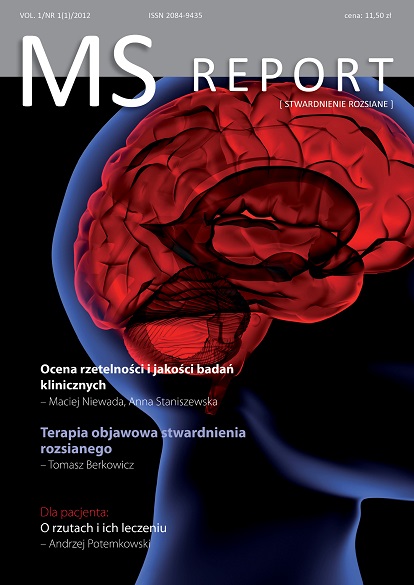Assessment of reliability and quality of clinical trials Review article
Main Article Content
Abstract
The evaluation of the quality and reliability of clinical trials has essential meaning in setting standards of diagnostic and therapeutic procedures. In the paper the most important elements of organizing and interpreting results of clinical trials are presented. In the context of defined systematic errors role of randomization and allocation concealment, blinding methods, gradation of study outcomes, selected statistic issues of the study data analysis and interpretation of clinical trials’ results are discussed. To fully illustrate the complexity of the evaluation of quality and reliability of clinical trials, specific scales, separate for experimental trials and observational studies, are reported.
Article Details
Copyright © by Medical Education. All rights reserved.
References
2. Zhehui L., Gardiner J.C., Bradley C.J.: Applying propensity score methods in medical research: pitfalls and prospects. Med. Care Res. Rev. 2010; 67: 528-54.
3. Pirracchio R., Sprung C., Payen D., Chevret S.: Benefits of ICU admission in critically ill patients: Whether instrumental variable methods or propensity scores should be used. BMC Medical Research Methodology 2011; 11: 132.
4. Lalani T., Cabell C.H., Benjamin D.K. et al.: Analysis of the impact of early surgery on in-hospital mortality of native valve endocarditis: use of propensity score and instrumental variable methods to adjust for treatment-selection bias. Circulation 2010; 121: 1005-13.
5. Earle C.C., Tsai J.S., Gelber R.D., Weinstein M.C., Neumann P.J., Weeks J.C.: Effectiveness of chemotherapy for advanced lung cancer in the elderly: instrumental variable and propensity analysis. J. Clin. Oncol. 2001; 19: 1064-70.
6. Schulz K.F., Grimes D.A.: Generation of allocation sequences in randomised trials: chance, not choice. Lancet 2002; 359: 515-9.
7. Wood L., Egger M., Gluud L.L. et al.: Empirical evidence of bias in treatment effect estimates in controlled trials with different interventions and outcomes: meta-epidemiological study. BMJ 2008; 336: 601-5.
8. Huitfeldt B., Hummel J.: The draft FDA guideline on non-inferiority clinical trials: a critical review from European pharmaceutical industry statisticians. Pharm. Stat. 2011; 10: 414-9.
9. Diener H.C., Connolly S.J., Ezekowitz M.D. et al.: Dabigatran compared with warfarin in patients with atrial fibrillation and previous transient ischaemic attack or stroke: a subgroup analysis of the RELY trial. Lancet Neurology 2010; 9: 1157-63.
10. Agencja Oceny Technologii Medycznych. Wytyczne oceny technologii medycznych (HTA). Warszawa 2009.
11. Bryant D., Schunemann H., Brozek J., Jaeschke R., Guyatt G.: Ogólne podstawy i zasady interpretacji punktów końcowych ocenianych przez pacjenta. Polskie Archiwum Medycyny Wewnętrznej 2007; 117(4): 5-11.
12. Fergusson D.A., Hebert P.C., Mazer C.D. et al.: A comparison of aprotinin and lysine analogues in high-risk cardiac surgery. The New England Journal of Medicine 2008; 358: 2319-31.
13. Major cardiovascular events in hypertensive patients randomized to doxazosin vs chlorthalidone: the antihypertensive and lipid-lowering treatment to prevent heart attack trial (ALLHAT). ALLHAT Collaborative Research Group. JAMA: The Journal of the American Medical Association 2000; 283: 1967-75.
14. Echt D.S., Liebson P.R., Mitchell L.B. et al.: Mortality and morbidity in patients receiving encainide, flecainide, or placebo. The Cardiac Arrhythmia Suppression Trial. The New England Journal of Medicine 1991; 324: 781-8.
15. Califf R.M., Adams K.F., McKenna W.J. et al.: A randomized controlled trial of epoprostenol therapy for severe congestive heart failure: The Flolan International Randomized Survival Trial (FIRST). American Heart Journal 1997; 134: 44-54.
16. Phrommintikul A., Haas S.J., Elsik M., Krum H.: Mortality and target haemoglobin concentrations in anaemic patients with chronic kidney disease treated with erythropoietin: a meta-analysis. Lancet 2007; 369: 381-8.
17. Rossouw J.E., Anderson G.L., Prentice R.L. et al.: Risks and benefits of estrogen plus progestin in healthy postmenopausal women: principal results From the Women’s Health Initiative randomized controlled trial. JAMA: The Journal of the American Medical Association 2002; 288: 321-33.
18. Haguenauer D., Welch V., Shea B., Tugwell P., Adachi J.D., Wells G.: Fluoride for the treatment of postmenopausal osteoporotic fractures: a meta-analysis. Osteoporos. Int. 2000; 11: 727-38.
19. Hampton J.R., van Veldhuisen D.J., Kleber F.X. et al.: Randomised study of effect of ibopamine on survival in patients with advanced severe heart failure. Second Prospective Randomised Study of Ibopamine on Mortality and Efficacy (PRIME II) Investigators. Lancet 1997; 349: 971-7.
20. Oliver M.F.: Cholesterol, coronaries, clofibrate and death. The New England Journal of Medicine 1978; 299: 1360-2.
21. Devereaux P.J., Yang H., Yusuf S. et al.: Effects of extended-release metoprolol succinate in patients undergoing non-cardiac surgery (POISE trial): a randomised controlled trial. Lancet 2008; 371: 1839-47.
22. Packer M., Carver J.R., Rodeheffer R.J. et al.: Effect of oral milrinone on mortality in severe chronic heart failure. The PROMISE Study Research Group. The New England Journal of Medicine 1991; 325: 1468-75.
23. Sackner-Bernstein J.D., Kowalski M., Fox M., Aaronson K.: Short-term risk of death after treatment with nesiritide for decompensated heart failure: a pooled analysis of randomized controlled trials. JAMA: The Journal of the American Medical Association 2005; 293: 1900-5.
24. Nissen S.E., Wolski K.: Effect of rosiglitazone on the risk of myocardial infarction and death from cardiovascular causes. The New England Journal of Medicine 2007; 356: 2457-71.
25. Meinert C.L., Knatterud G.L., Prout T.E., Klimt C.R.: A study of the effects of hypoglycemic agents on vascular complications in patients with adult-onset diabetes. II. Mortality results. Diabetes 1970; 19(Suppl.): 789-830.
26. Barter P.J., Caulfield M., Eriksson M. et al.: Effects of torcetrapib in patients at high risk for coronary events. The New England Journal of Medicine 2007; 357: 2109-22.
27. Jadad A.R., Moore R.A., Carroll D. et al.: Assessing the quality of reports of randomized clinical trials: is blinding necessary? Controlled Clinical Trials 1996; 17: 1-12.

